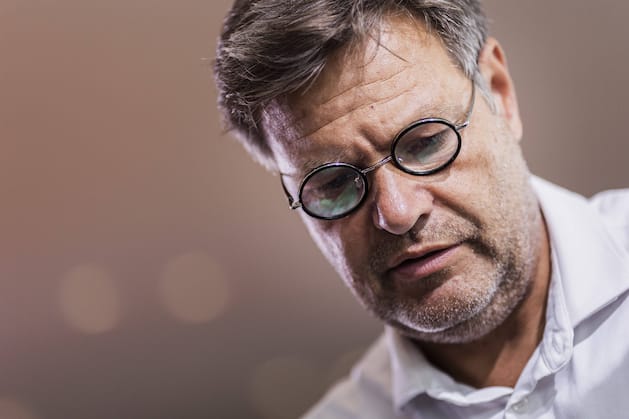With his energy policy, Robert Habeck has turned large parts of the Greens against himself. The minister is now caught in the Joschka Fischer trap. One wonders how long Habeck can stand the “friendly fire” from his own ranks.
The fight for Lützerath is about a more or less peaceful rescue of the global climate. Others take the eviction of a total of seven houses as an opportunity to take a stand against the “system” – even with violence.
Meanwhile, another front runs along the edge of the Rhenish lignite mining area. Between government greens and defenders of the pure green doctrine, i.e. between realos and predominantly young fundis. And she rages violently.
Economics and Climate Minister Robert Habeck has large parts of the party against him. Because it is undeniable that under his leadership, energy policy is diametrically opposed to what the Greens had originally planned, namely to make 2023 the year of climate protection.
Instead, two ministers from the Greens, Habeck and his North Rhine-Westphalian colleague Mona Neubaur, have agreed with the energy company RWE that lignite may still be mined in Lützerath. In return, the phase-out of coal in the Rhenish mining area will be brought forward by eight years to 2030.
What RWE plans is legally secured. Two ministers have signed an agreement with the energy company with the backing of their respective coalition partners. There is also no doubt about the democratic legitimacy. Habeck even has the backing of the party. At the federal delegates’ conference in October last year, the Green Youth wanted to push through a moratorium on Lützerath. 294 delegates voted in favor of this motion, 315 against. Habeck and the party leadership prevail – albeit very narrowly.
Although the “Fundi” wing of the Greens otherwise attaches great importance to scrupulously observing the internal party resolutions, the Green Youth in Lützerath marches side by side with numerous environmental organizations. At their side are left-wing extremists who are used to rioting and violence. The October party convention decision is suddenly no longer worth anything.
Of course, Habeck expects an unusually large amount from his own party. Before the coal exit postulated by the Greens comes the coal entry. Habeck had shut down coal-fired power plants reactivated. He organizes imports of hard coal and initially expands the opencast lignite mine.
Ironically, the green climate minister imports liquid gas obtained from fracking. To this end, he had LNG terminals built, although as Schleswig-Holstein’s Environment Minister he had strictly rejected them. He even accepted, without notable resistance, that three nuclear reactors may continue to produce electricity at least until April next year.
Habeck is certainly not doing this out of high spirits. Rather, in the face of the Russian invasion of Ukraine, he is acting responsibly and pragmatically – more pragmatically than the green philosopher could have been given credit for. That earns him respect from the population and even from the CDU/CSU opposition. But he is antagonizing the ideological climate fundamentalists in his own party.
Habeck and the Green ministers at federal and state level would have it easier if the eco-party could at least show visible success in the expansion of renewable energies. However, there has been no significant progress either in the approval or in the expansion of the transmission lines for the transport of electricity generated from wind power from the coast to the industrial sites, nor in accelerating the approval procedures for wind turbines.
The government Greens can point out that within a year and in the difficult interaction with two other government parties, the world cannot be changed overnight. The governing faction emphasizes – rightly – the responsibility for the country. Such arguments, however, hardly allow “Fundis” to apply.
If you know which devices at home use how much electricity, you can make targeted savings. Our e-paper shows which devices use how much electricity for all common household appliances, from ovens and hobs to refrigerators and washing machines to TVs and WLAN routers. There are also a number of instant power-saving tips.
The Greens are a divided party, as has become apparent at the party conference and now in Lützerath. It is noticeable that hardly anyone in the parliamentary group is vehemently in favor of Habeck. Many MPs are well aware that many at the party base in their constituencies do not agree with Habeck’s pragmatic course. They don’t want to spoil it with them.
Likewise, many Green politicians fear that some of the environmental activists will go off the flag. Luisa Neubauer from “Fridays for Future”, herself a member of the Greens, makes no secret of the alienation between parts of the environmental movement and the Greens. “The Greens are making a big mistake,” she wrote on Twitter. That read like a warning and probably should be one. If there were a general election on Sunday, Neubauer would hardly have her activists march nationwide as they did before the 2021 general election.
Habeck is in a similar position to Joschka Fischer almost a quarter of a century ago. The first Green foreign minister in the history of the Federal Republic persuaded the Greens in the Bundestag to support the Bundeswehr’s first combat mission in the Kosovo war. The party base rebelled, the pacifist groups loyal to the Greens were up in arms, and Fischer was hit in the head with a paint bag at a party conference.
Fischer finally prevailed against the “Fundis” in his own ranks. This wasn’t an easy fight. In comparison, Habeck has it easier now, at least until now. The only question is how long Habeck can stand the “friendly fire” from his own ranks.








